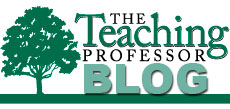There is no question that many students experience pretty serious burnout by the end of the semester. It’s easy for us to recognize it because we experience it ourselves. Even so, I have to admit I was surprised by the findings of a survey of one cohort of business majors.
Read more ›CURRENT ARTICLE • September 09
OTHER RECENT ARTICLES
The previous blog post featured two quotes advocating reflection about teaching philosophy and teaching practice. The goal is to discover discrepancies (if there are any) between what one believes about teaching and how one teaches. The problem? It’s darn difficult to be objective about one’s teaching. We just have too much of ourselves invested in the endeavor to see clearly what we are doing and why. But we aren’t blind. We can see if we make a concerted effort. Let me suggest some ways of looking that might help us see what we may have missed or not seen clearly.
Read More ›“Conscientious pedagogical reflection is necessary to produce a complete, well-developed teaching philosophy. The absence of pedagogical reflection can result in daily instruction that fails to reflect an instructor’s teaching philosophy or instructional belief system accurately. In particular, an underdeveloped teaching philosophy may translate into a teaching style full of inconsistencies, characterized by poorly coordinated and designed instruction.” (p. 182)
Read More ›I was traveling again last week and dining by myself in a local restaurant. I had forgotten to bring something to read, but the restaurant, named the The Library, had stacks of old books decorating the short walls between different sections of the dining room. In the stack near my table I found Teacher Education in Transition, published in 1969. The book smelled as old as it looked.
Read More › “Feedback by nature must be negative to an extent if it is to be helpful in improving performance. Much of the feedback that instructors give on assignments is to specifically point out the shortcomings of a student’s work and motivate the student toward improvement. Such feedback is intended to be received as ‘constructive criticism.’ However, although students may say they value feedback in general, when it is about their own performance and by extension themselves, the impact on self-esteem may provoke a negative reaction.” (p. 174)
“Feedback by nature must be negative to an extent if it is to be helpful in improving performance. Much of the feedback that instructors give on assignments is to specifically point out the shortcomings of a student’s work and motivate the student toward improvement. Such feedback is intended to be received as ‘constructive criticism.’ However, although students may say they value feedback in general, when it is about their own performance and by extension themselves, the impact on self-esteem may provoke a negative reaction.” (p. 174)
Last week I participated in a beginning of the academic year event for faculty. It included a panel of bright, articulate upper-division students.
Read More ›Dad died on July 31. He was 98 and it was time, although I don’t think that makes the empty feeling any smaller.
Read More ›“One telling measure of how differently teaching is regarded from traditional scholarship or research within the academy is what a difference it makes to have a ‘problem’ in one versus the other. In scholarship and research, having a ‘problem’ is at the heart of the investigative process; it is the compound of the generative questions around which all creative and productive activity revolves. But in one’s teaching, a ‘problem’ is something you don’t want to have, and if you have one, you probably want to fix it. Asking a colleague about a problem in his or her research is an invitation; asking about a problem in one’s teaching would probably seem like an accusation. Changing the status of the problem in teaching from terminal remediation to ongoing investigation is precisely what the movement for a scholarship of teaching is all about.”
Read More ›Principle: To become self-directed learners, students must learn to assess the demands of the task, evaluate their own knowledge and skills, plan their approach, monitor their progress, and adjust their strategies as needed.
Read More ›Here’s a strategy that helps students look at more than the grade when an exam is returned. An exam wrapper (I like the name) is a handout attached to the exam that students complete as part of the exam debrief process. The wrapper directs students “to review and analyze their performance (and the instructor’s feedback) with an eye toward adapting their future learning.” (p. 251)
Read More ›




